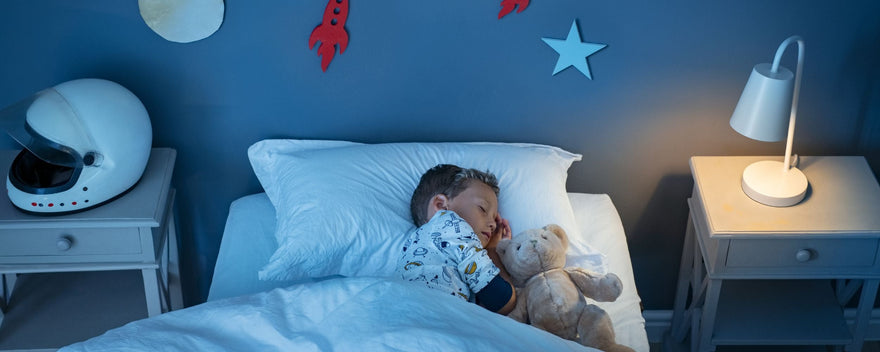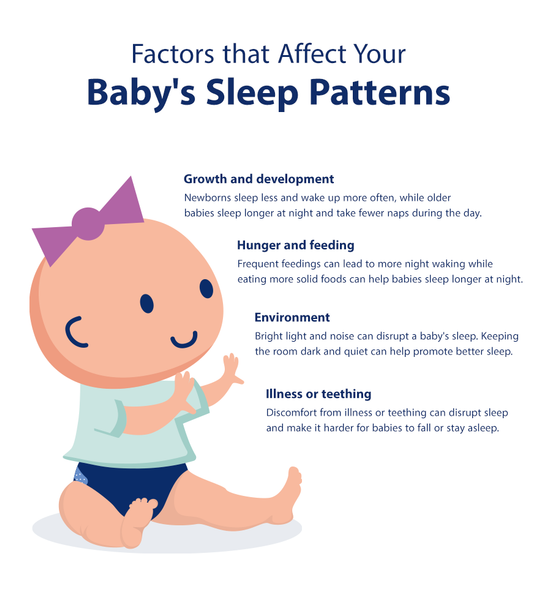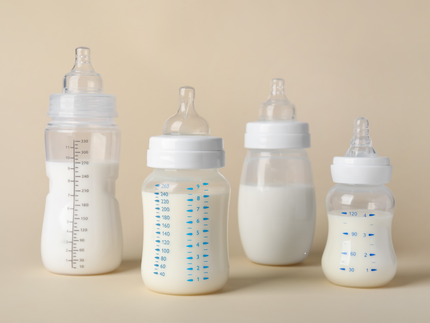Baby Sleep Patterns for Different Age Groups

Sleep is an essential aspect of a baby's overall health and well-being. It is during sleep that the body repairs and rejuvenates itself, and for babies, it is critical for their growth and development. While it's no secret that babies need a lot of sleep, what may not be as well-known is that a baby's sleep patterns change considerably in the first year of their life.
Newborns have a unique sleep pattern that may seem unpredictable, spending approximately 70% of their time asleep but in short periods. For parents, this means a constant cycle of feeding, changing, and providing tender loving care, which can be exhausting as much as it is rewarding. It is understandable for parents to worry about their baby's sleep routine, especially during phases of change. However, it is also crucial for parents to prioritize their own sleep, as it directly affects their well-being.
In this article, we will discuss the importance of sleep for babies and why baby sleep cycles change over the months. We will also dive into the sleep patterns of babies around 3 months, 3 - 6 months, and 6-12 months of age to help parents understand what they can expect and how they can support their baby's sleep needs.
The Importance of Good Sleep for Your Baby
As a parent, ensuring your baby gets enough sleep can be challenging, but understanding the importance of it can motivate you to establish healthy sleep habits for your little one.
Why Does a Baby's Sleep Pattern Change?
A baby's sleep pattern changes in duration due to their rapidly developing brains and bodies, leading to the need for different amounts of sleep at different stages of development.
There are several factors that can influence changes in a baby's sleep pattern:

Sleep Cycle for Babies Around 3 Months
At around 3 months old, a baby's sleep cycle starts to become more organized, with the development of night and day sleep patterns. Their sleep cycle consists of light sleep, deep sleep, and dream sleep. Sleep cycles also become longer, which may result in less waking and resettling during sleep. Most babies still sleep for 14-17 hours every 24 hours, with some having longer sleeps at night, up to 4-5 hours. Unlike newborns, who tend to sleep only in short stretches, 3-month-old babies are likely to take more naps during the day and sleep for longer stretches at night. However, they may still wake up frequently during the night for feeding or changing.
At this age, babies are also starting to learn the rhythm of day and night. Parents can help their baby learn to sleep more at night by exposing them to light and playing during the day, and providing a dim and quiet environment at night. Overall, the sleep cycle for a 3-month-old baby is characterized by increasing organization and longer sleep periods, but still with frequent waking during the night.
Sleep Pattern for Babies Around 3-6 Months
Between the ages of 3 and 6 months, babies' sleep patterns become more structured, with longer stretches of sleep at night and more regular daytime naps. Most babies at this age will sleep for 12-15 hours every 24 hours, with some having longer stretches of up to six hours at night by six months old. Daytime naps may become more predictable, with babies having 2-3 naps of up to two hours each.
Additionally, babies' sleep cycles become longer, which may result in less frequent waking and resettling during the night. Most babies at this age sleep for a total of 14-15 hours a day, with some sleeping up to 8 hours at night. The amount of active sleep also begins to reduce, and they enter quiet sleep at the beginning of their sleep cycles. However, babies at this age still tend to wake up at least once during the night.
Sleep Pattern for Babies Around 6-12 Months
Between 6 and 12 months, babies experience significant changes in their sleep patterns. Most babies sleep for an average of 11 to 14 hours every 24 hours. The 6 month baby sleeping time tends to be longer at night and they take fewer daytime naps. At night, most babies are ready for bed between 6 pm and 10 pm and take less than 40 minutes to fall asleep. While many babies may not wake up at night or waking may happen less often, some babies may still need adult assistance to settle back to sleep 3-4 times a night.
Babies between 6 and 12 months generally take 2-3 naps that last between 30 minutes and 2 hours. Although they wake up less frequently during the night, babies may still experience sleep disturbances due to teething and separation anxiety. Teething can cause pain and discomfort, while separation anxiety can lead to increased night waking and make it harder for babies to fall asleep. Establishing regular daytime and bedtime routines can help babies to fall and stay asleep.

Common Baby Sleep Problems
Disrupted and erratic sleep may be a temporary adjustment period for your baby, but there could also be underlying issues causing the problem. Some common baby sleep problems are:
- Separation anxiety: Moving your baby to their own room after 6 months may cause separation anxiety in infants aged 8-12 months and may fuss or cry when left alone, but they will learn over time that you're not gone forever.
- Genes: Gene mutations can affect sleep duration in babies, and research shows that genes play a significant role in whether infants sleep through the night, especially at nighttime. Parents with insomnia may also increase their baby's predisposition to it.
- Environmental factors: Parents' emotional availability and involvement can affect infant sleep problems, with too much involvement leading to disrupted sleep.
- Excessive sleepiness or insomnia: Excessive sleepiness or insomnia in babies may indicate underlying medical conditions, and sleeping for more than a certain number of hours can also be a sign of an underlying medical issue.
- Disruptive sleep apnoea: Disruptive sleep apnea is a rare condition in infants that occurs due to airway abnormalities causing breathing obstruction.
- Other underlying medical conditions: Conditions such as fever, infections, and abnormal reflux, as well as psychiatric conditions such as mental health conditions or ADHD, can cause sleep problems in infants.
Tips on Improving Your Baby’s Sleep
Ensuring your baby gets enough sleep can be difficult and inconsistent since every child has their own sleep patterns. However, it is recommended that the first six months is how long baby should sleep in a cot in the same room as you. After that, you can consider moving them to their own room.
Here are some tips on how to improve your baby's sleep:
The joys of motherhood are endless, but one of the greatest challenges can be navigating your baby's ever-changing sleep patterns. Establishing a healthy sleep routine for your baby can be challenging, but with patience and perseverance, it's possible.
Good quality sleep is essential for a baby's growth, weight, mental development, and immune system. Understanding the factors that can influence a baby's sleep pattern can help parents establish healthy sleep habits. Sleep patterns change as babies develop, with more structured and longer sleep periods at night and fewer naps during the day.
Establishing regular daytime and bedtime routines can help babies to fall and stay asleep. Parents can support their baby's sleep by creating a quiet and dark environment at night and exposing them to light and play during the day. Although it may be challenging, it's better not to worry about how your baby sleeps, as long as they are healthy and content.










